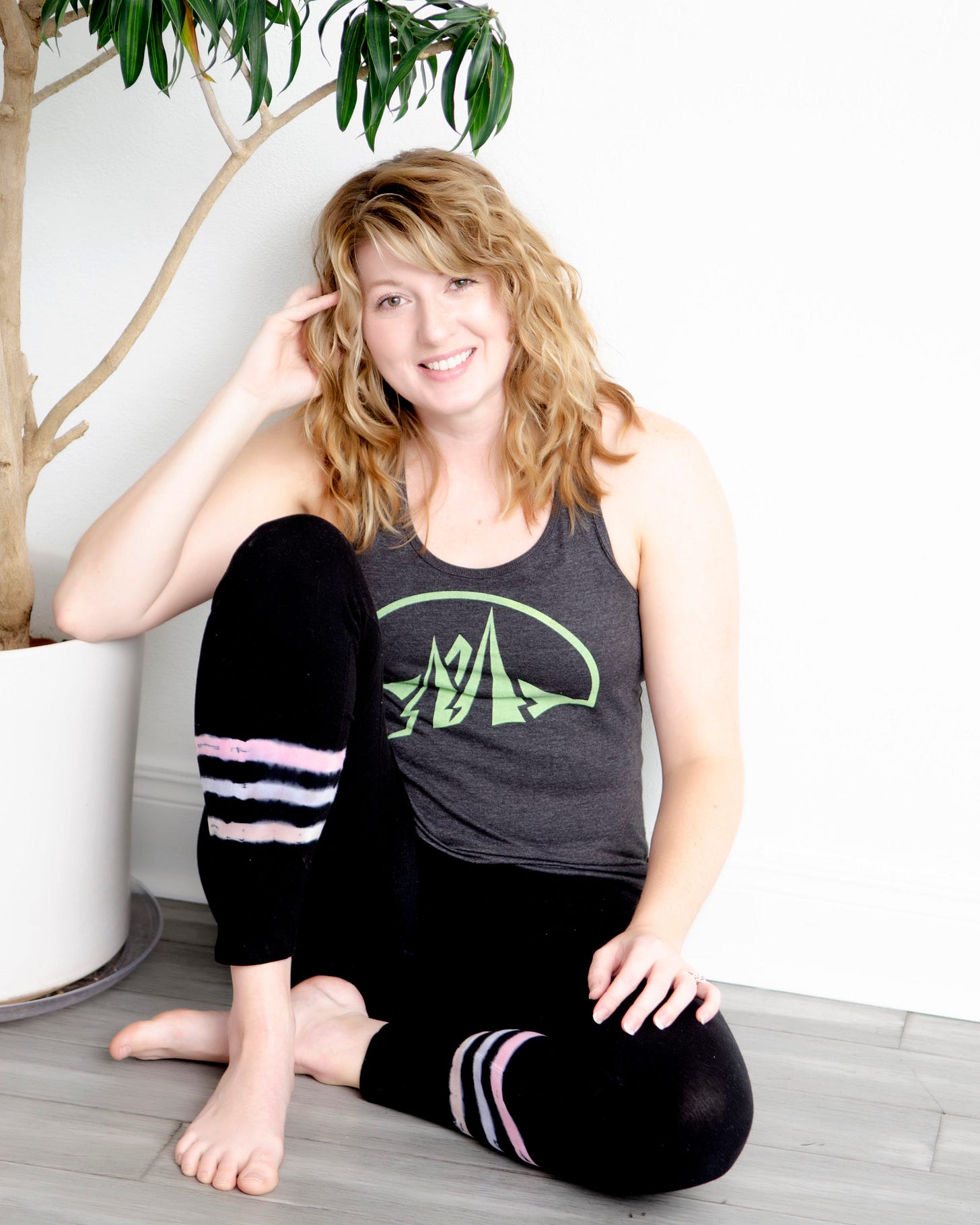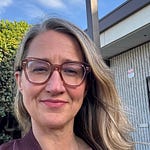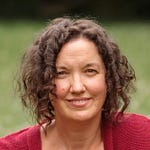In 2017, coming off a health scare, I needed to become more active physically. My nutritionist suggested I reach out to Laurie LeCompte about yoga. At the time, she was offering private lessons at the Meridian Center on Wallace Avenue in Louisville. Laurie took great efforts to understand my health background – my congenital heart defect, sloped shoulders, near-scoliosis, and weak left arm. She created a yoga practice around my needs and with my aims in mind. For example, it’s good if I can improve my strength and posture – but it’s imperative that they don’t degenerate. Now Laurie owns Yoga Baum, a thriving yoga studio, still in the Meridian Center. I’ve worked with her for more than seven years. My weekly yoga class is a bedrock of my health and strength routine. They’re critical for me.
In 2022, I sat down for a conversation with Laurie. We delve into her journey into yoga and becoming a business owner, how you should evaluate your yoga and fitness “progress,” her interest in ferrets, what “self care” really should mean, reading horror books, and much more!
How did you first get attracted to yoga? What got you interested in yoga?
I was always into physical things and physical fitness. Really, I was looking for something as cross-training for running. I was running a lot of half-marathons. I needed more flexibility, mobility, those kinds of things. And I was having the typical runner-type pains, in my knees and hips, and I wanted to work them out. I'd only ever done endurance sports. I ran cross country in high school. I rowed in college. So I didn't have any experience with anything else. And I was curious about it. Also, it was a time when I was feeling a lot more stressed and anxious. So the idea of a more relaxing and meditative practice was appealing to me, as well as focusing on myself and not having to talk to anybody. Having that time for myself was really attractive.
How did you get started? Did you find a yoga instructor?
There was a studio that I would always pass. They had a 30-day deal and I went there. I had tried yoga a couple of times before that – with friends in college for a couple of classes. But nothing much. So doing yoga was pretty intimidating.
How did things develop from there? You started trying to solve a physical problem, and you became a teacher and then a yoga business owner. That’s quite a progression. Tell me more about that.
I always tend to make my hobbies into jobs somehow. I don't know if that's the perfectionist in me, but I always want to know more about what I’m doing. I had this desire to know more so I completed yoga teacher training. I didn't plan on actually being a yoga teacher. I already had jobs teaching German as an adjunct around town. So I took the teacher training because I wanted to know more, I liked it a lot, and it was fun. But of course, a lot of teachers will tell you that it starts that way. Then as soon as people know that you're a yoga teacher, you're called on to be a substitute teacher in classes. So literally the week I returned from teacher training, I had my first classes to teach. It took no time to find a job.
The fact you found a teaching role immediately – it speaks to the explosion of interest in yoga across the country over the past 20 or 30 years. What explains that astounding growth?
There was a big yoga boom when people in Hollywood started getting into yoga and looking into different types of fitness and spiritual practices. Some teachers would go to India to study and bring back what they taught, and some places started hosting famous yoga teachers for workshops. So a lot more people had exposure to yoga through these visiting teachers, and through what they were seeing celebrities doing.
Here's a terminology question I struggle with. I have a strength “trainer” and a physical “therapist.” When it comes to you and yoga, I struggle to describe what you do. What do you call yourself? How do you describe what you do?
The terms “teacher” and “instructor” are mostly interchangeable to me. If I want to get picky, teacher has a better ring to it, maybe more clout. I am actually teaching something and instructor sounds more like a fitness instructor simply leading people through the motions. And yoga is more than fitness. You can definitely get fit doing yoga, but since it's more, I prefer the term teacher. But please don’t call me your “guru”!
How do you think about a student's progress? Is “progress” even the right way to think about it? How do you evaluate how a student is doing and what they need to do going forward?
That's a really interesting question because people come in with certain goals, and oftentimes just by practicing yoga, their goals will change. They may start wanting to achieve something physically impressive. But then the more they practice yoga, that becomes less necessary for them – they just want to feel good. So it really depends. When my clients start out, I have them fill out an intake form. It gives me a lot of information about why they're seeing me in the first place. I want to understand what progress looks like for them. A lot of people's goals are oriented around pain relief. When they come to see me for private lessons, the most common reason they come is because they're in pain. And it's a pretty easy thing to measure: how much pain were you in when we started? And how much pain do you feel today?
So for private lessons, most people see you because of pain. What is it? Acute pain? Chronic pain?
Back pain is the main reason. But there are also injuries and people who are recovering from surgery, like a knee replacement. Some people feel terrified to move after a surgery like that. They think if they move a certain way, it’ll hurt really badly. And that sort of perpetuates the cycle of those areas becoming super-sensitive. So they come to yoga to learn a different way to move that hopefully feels better.
What’s the right timescale to be thinking about progress when you start a yoga practice? Looking back, I could tell a huge difference after about a year.
I think it depends on why they're here. For some of the pain issues, I would say a couple of sessions can make a difference. That doesn’t mean the pain will be gone. But they can tell a difference – in pain level and in their movement. Your goals were long-term, and so it took you longer to become aware of the progress.
I plan to keep doing this for life because I want to postpone regression as far as long as possible. Again, getting stronger is great, but I do yoga with you to help prevent deterioration.
We also have to be realistic with goals. People who want to get stronger – at some point they’re going to reach a limit, either because of age or just physical capacity for those things. So yes, there are reasonable goals and sometimes we have to have those conversations too, about what’s realistic. People might come in wanting to learn how to do a handstand. If they can't hold a plank for 15 seconds, we're pretty far off from the handstand.
We've gotten me up to where last year I held a five-minute plank. But my desire to go to a six-minute plank is virtually zero. It doesn't matter. But being able to maintain a plank for four of five minutes, that’s somewhat indicative that I’ve maintained strength, which is what I want to do. Let’s move to a different subject. Tell me about the mental shift you made when you moved from being a yoga student to a yoga teacher. And how do you think about being a teacher today?
Even now, there’s more and more to learn – absolutely a universe to explore. Continuing education is super important to me and at the studio. If you teach here, there's actually an annual continuing education requirement. So it’s very important to me that we all remain students and we all remain fresh. And I think that we should change as teachers throughout our careers. When I started teaching yoga, I was already teaching German. There was definitely an advantage there – I knew about teaching and about being in front of people. Coming into teaching yoga, a lot of people take a lot longer to get over their fear of public speaking before they can successfully get through a 60-minute class. And that was easy because I had already been doing it.
How about the mental shift in moving from being a yoga teacher to being a studio owner? Tell me about that.
I was very ready to be a business owner and to work for myself. I was getting pretty fed up with the bureaucracy at the university level and working in that environment. And like I said, I was an adjunct, so I had zero power. I needed more say in what was going to happen. I think that most yoga teachers probably already see themselves as business owners because they are independent contractors. And even if they're teaching all over town, that is their business. That's their brand. The dramatic shift for me was owning the physical space. But earlier, I already was running my own business and I was building my own brand. It might not have been called Yoga Baum yet but it was always building to that. There is a natural progression with yoga teaching. You keep learning more. That lends itself to leading workshops. And that leads to teacher training. And then you need a space for teacher training. So now you have a space and you might as well also offer group classes. So it builds in that way. But having my private clients led me to want a location, and that's when I started renting space at Meridian. At some point, I needed more space.
As you got into teaching and then owning the business, what's something you spent a ton of time and energy on that you could've skipped entirely?
I trained in Ashtanga Vinyasa yoga initially. And there's hardly any verbal instruction, as far as how to do the postures, when leading in that style in a group class. You memorize the Sanskrit name of the pose, and the Sanskrit count because there's a number in Sanskrit for each movement. So it's literally like: you say “one” in Sanskrit and “inhale” and that is the cue to lift your arms. Then you say “two” in Sanskrit and “ exhale” and that’s the cue to fold forward. It’s very formatted. I trained in that style, but I never ended up teaching that style. It wasn’t a waste because I learned a lot of Sanskrit and that first training I completed went way beyond that simple memorization. But I never taught in a traditional Ashtanga Vinyasa class. I teach the postures from that series all the time, but not in that strict method. Since I teach private yoga, none of my sessions with clients are ever the same and everybody's different. So the Ashtanga Vinyasa approach didn't really have a lot of practical application in what I am doing. So as far as my teaching goes, that memorization of the series with Sanskrit counting was not useful.
How do you find or recruit or select new Yoga Baum teachers?
That's a great question. It's actually a question that we go over in our teacher training when we talk about the business of yoga. When we talk about finding jobs, we discuss how to reach out to studios. For me, it's really important that potential teachers know us and that they know the vibe of our community. I get a lot of emails that say, “Hey, I'm a yoga teacher. I live in Louisville. Here's my experience. Can I teach for you?” And they've literally never stepped foot in the door. They've never met me. And it bothers me that they've never been here. It feels like they don’t care much, right? Most of our teachers have come from our teacher training classes. Teachers don’t have to have graduated from Yoga Baum’s teacher training, but it often works out that way because those people end up being part of our community. I want to see that teachers are dedicated – to their students, to what we’re building here. Our community has a certain energy and I want to keep it that way.
Tell me about the community you're trying to build.
I think it's honestly about the approach that we have to teaching yoga. I think we attract certain students because of our approach. We’re really trying to help people build a sustainable and empowering yoga practice. That’s part of our mission statement. We're not prioritizing really extreme postures or postures that are really popular because of Instagram or because they look cool. We’re really trying to help people feel good. We might do some postures that are harder to do, but it's always in a way that’s approachable and accessible for all levels. So that's a really big part of who we are. We want everybody to be able to practice yoga.
We offer a mixture of practices. We have flow yoga, we have restorative yoga. We think that balance is really important. We offer challenging practices, but we also have much softer practices. We think that they're both important. Our philosophy centers around the idea of accessibility, and making movement feel good and empowering.
Let’s go back to something you said earlier. You run, you row, you weightlift. You do yoga. Tell us about this multi-pronged approach to fitness. How do you think holistically about fitness or strength?
I don't think that there's one way necessarily that it should be, but I do think that people should enjoy what they're doing. One of the things that can happen when people get really into yoga, and one of the reasons that they don't stay with it is they put all of their eggs in one basket. They expect yoga to be everything – their cardio, their strength training, the way they gain flexibility, they want to feel relaxed – everything. And they come once a week – and we can't do it. It’s not going to work and it doesn’t work that way. Yoga can give you all of those things, but you're going to have to practice a lot. But it also doesn't have to be everything. When we put so much pressure on yoga to be all of that, it's not successful. In order to enjoy my practice, I also don’t expect everything from it, and I do different things. I can lean on the different parts of yoga depending on what I need in that moment, but realistically, I know that I’m not getting fit while I’m laying on bolsters in a restorative yoga class and I also know I’m not resting and recovering as much as I need to if I’m doing flow classes every day. So I do different styles of yoga for balance, and I do other activities because I enjoy them and they have benefits outside of what the type of yoga I’m practicing can give me.
How'd you get into like weightlifting? You have an entire Instagram page just dedicated to your lifting.
I've weight lifted on and off for a long time because of other sports. We had to lift in college for rowing. I started up a more serious strength-training routine because one of my friends wanted me to go with her. Then I figured out that I was pretty decent at deadlifting, so I focused on that. I've always been attracted to intensity. That's part of why I need yoga. I need to chill out. I need to be still, I need some time for myself. And yoga gives me that. There's something about the intensity of strength training and always challenging myself to get stronger that I love. And strength training practices have helped me a lot as a yoga teacher. Getting ideas for how I want to approach my classes, getting ideas for new movements. There are certain aspects of the movement or the training that translate into me being a better teacher. All of that crosses over in a really powerful way that helps me to be a more interesting teacher.
On Instagram, you describe yourself as a “self care curator.” What does that mean?
I want to help people figure out what they would have the most success in as far as keeping up their self care practices. And if they don't even know what self care is, that's a good place to start.
So what's that mean to you? Self care, self compassion. We see those terms a lot in today’s world. How do we do that in the modern world?
I'm glad you're asking this because this is actually something I've thought about changing the wording of because it's so overused now. It barely means anything anymore. But for me, self care is like a dedicated activity or something you're doing for yourself simply to do it for yourself to feel better or to feel good about it. It could be a lot of different things, but it doesn’t need to be educational. It doesn't need to be anything other than enjoyable for you. Setting aside the time to actually have that opportunity is I think the hardest part for a lot of people. I think where they get stuck is they don't know what it looks like for them. We could and do have a conversation about it. What do you like? What’s your schedule like? We could talk about yoga, or meditation or mindfulness or things like journaling. When I say that I'm a self care curator, I want to help them choose practices that make sense for their schedule, budget, and life. And if I can help them, maybe we work together. Maybe it has nothing to do with me. Maybe their self care comes through fishing. I don’t do that and I can’t help with that. But maybe I can help them discover that as a path for self care.
Let’s shift gears. You are a vegetarian and you probably get asked a lot: “What's the hardest thing about being a vegetarian?” I want to ask you: What's the easiest thing about being a vegetarian?
I've been a vegetarian for so long – since 2008. Fourteen years. So it is just easy now. I'm what they call a “Bambi vegetarian.” I love animals so much that I can't stand the idea of eating an animal. The question that made me switch was: could I slaughter this animal? Because I want to be connected with the whole process. This food I am consuming – what is happening in order to put it on my plate? And I realized that I couldn't do it – not even for fish. I couldn’t eat animals, knowing what it takes to get them onto my plate.
That's a very Michael Polian or Anthony Bourdain point. We are so removed in our current food cycle from the processes it takes to feed us animal meats and products.
I agree. I don't have problems with people who aren't vegetarians, but I do wish that we were all a little bit more connected to the process and understanding what really goes on.
Here's a question I want to ask because I will learn from this myself. You give the best gifts. Your gifts come across as personalized and sincere. But from what I can gather, they’re not super-customized or super-expensive. One year you gave us an air plant, one year was an eye mask, a couple were coffee mugs, and last year you gave a terrific tote bag. How do you approach client gift-giving?
It’s really hard. It’s a hard mix because I have a lot of clients. I start with our budget for this: how much per person? That plays a big role. Then I look at possible options. Then I try to think about items that either I would like or make sense for what we enjoy together. Something that’s universally appreciated – tea or coffee or something. But then it’s not only about getting a cup. How can we personalize it to make it a bit more special? I try to not select items that will clutter up people’s spaces or that they’ll just throw away. It has to hit that sweet spot. I will ask my husband for input or reaction to items. He has definitely shot down ideas!
When do you start thinking about this year’s gift? How long does this process take?
I probably start thinking about it pretty seriously in October and I try to buy it in November. Last year it was still late, despite having planned so far ahead, because of COVID supply chain issues.
This section of the interview comes from an economics podcast that I listen to. It's called “Overrated or Underrated.” I will say something. And you're going to tell me whether it’s overrated or underrated. First one: Thich Nhat Nanh’s influence on the world?
This is hard, right? He was so amazing, but I don't know what other people think. He’s probably underrated.
Stephen King's novels?
I mean, he's so popular. Well, let's say underrated because I like him a lot. You know what a lot of people haven't read? When he was writing as Richard Bachman – The Long Walk? That is so underrated. I don't even think anybody knows about it.
All right – a few fitness ones. The corpse pose?
Underrated. People will leave sometimes and they won't even do it. They're like, “I'm not here for that.” They don't even know what they're missing. Underrated, for sure.
The deadlift?
Underrated. Everybody thinks it's a back killer. But if you do it right, it's going to make your back into steel.
What about the squat?
I mean, I hate squats. So I would say overrated. But I will admit squats are great. Everybody should squat, but there doesn't need to be as much hype. Why don't we talk that much about the deadlift? There's too much hype, so it's overrated.
The plank?
People are down with the plank now. I think they appreciate it. So it's appreciated appropriately.
Ferrets as pets?
I will say it's underrated, but I am not saying that people should go get ferrets as pets. I don't really think most people can handle it. I have actually ended up with ferrets because people have gotten them because they liked my ferrets, and then they couldn’t take care of them properly. People think that they're easy – they think ferrets are like a hamster that you keep in a cage. But ferrets want their space. You have to get them out and they're super hyper and they want to play with you. Also, if you have dogs or cats or other pets, it's problematic. And ferrets do things like put their heads through the small open spaces in open doors, and you have to watch out for that. Most people don’t want to be that vigilant. If you have kids, they're great with kids, but kids might not be great for the ferrets. So I think that they're underrated, but most people shouldn’t get them as a pet.
Social media for business?
Everybody's using it now, right? But people aren’t using it to its maximum capability. So, maybe it's underrated.
Social media for personal use?
Overrated. It's such a time suck. Social media is a necessary evil in a lot of ways. I think that it can get really negative and I've read studies that say 30 minutes is all we can handle before it starts getting depressing. I think we can do a lot less on social media.
Margaritas?
Underrated always. I mean, they're still coming up with all these great flavor concoctions!
You read a lot – what books or thinkers have impacted you the most, however you define impact?
I read a lot of fiction. I don't read a ton of nonfiction unless it's for my yoga work. Reading is my self care, my way to decompress. I think I am more creative because of it – seeing all of the stories and characters. When you watch a movie, you get some sense for the characters. But in a book, you get to know them more intimately and you open your mind and imagination in new ways. Reading fiction has been shown to help with emotional intelligence. I feel like I can relate to the world better when I'm in a good reading space.
I find you really interesting because you combine these different things. You are American, but you know and have taught German. You attended a Catholic high school. Then you have this yoga-Buddhist-Asian influence too. You have this intriguing multi-faceted piecing together of your life. What’s a lesson you've learned about life that you think you've learned because of that multi-faceted approach to your life that I don’t have because my life isn’t that combination of influences?
My life has given me a lot of opportunities to experience different cultures on a pretty deep level. And that's helped me relate to people better and become more empathetic. I think that's something that we should see more of in business owners and especially a client-facing business like this one. In my day-to-day, I'm not just behind the scenes — I'm working with real people all the time and seeing a variety of personalities and cultural influences. If I can see things better from their point of view – it helps me understand what's important to them, how important it is, and how they can reach their goals better. Having a better read on people, and what truly matters to them, is the main thing.
Last question. Where do you see Yoga Baum in 10 to 20 years? Do you consider it your life’s work?
Oh yeah, totally. Absolutely. I've made jokes about this: now that I have my own business, I feel like I'm unhireable. I can't go back. It’s amazing to have a vision and then see it come to fruition like this. We definitely have long-term plans. We want to keep building this special community. I'm not talking about opening more locations, but expanding our offerings to different kinds of yoga that maybe aren’t on the schedule now. We started as a private client business. Group classes came later. So we're still working to build the group classes. We'd love to see growth and build our community. But we have lots of plans.
Laurie, thank you so much! I’ve truly enjoyed our conversation!


















